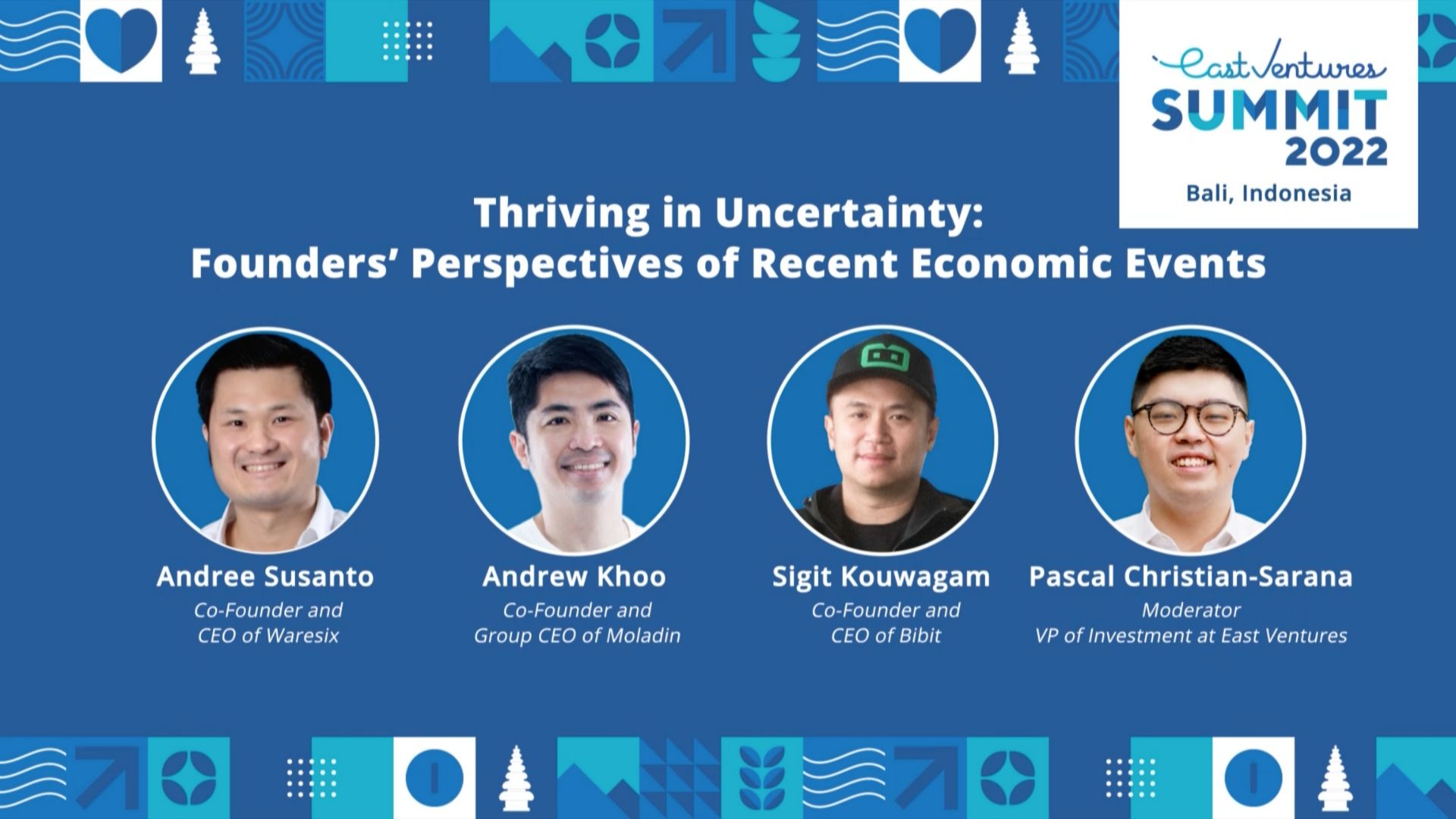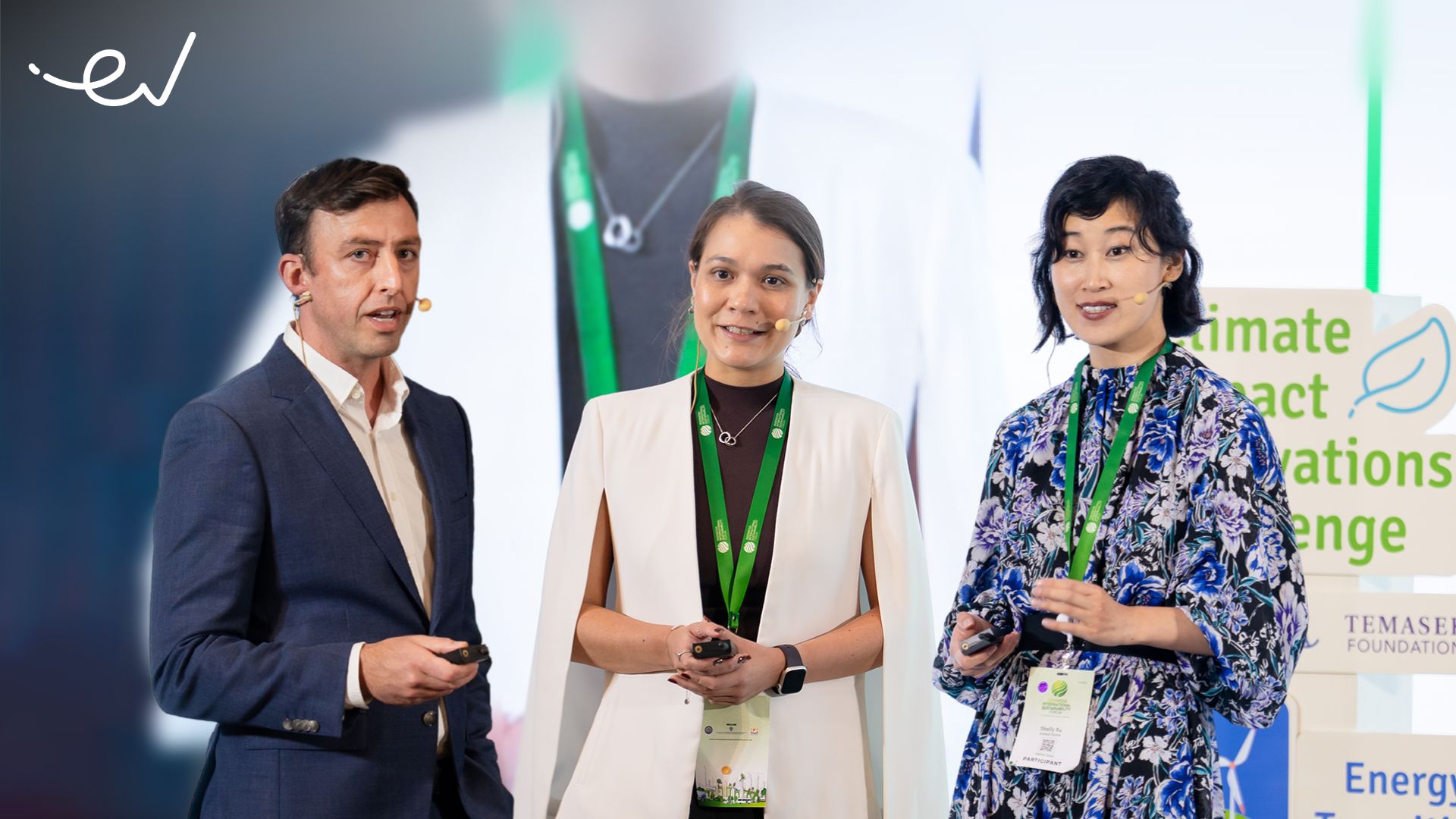Amid the global recession, Waresix, Moladin, and Bibit founders are confident their businesses align with Indonesia’s economic resilience
Lately, the promising future offered by the tech industry has been clouded by several issues, ranging from declining valuations to massive employee cuts. Global uncertainty is heightened by several downside risks, such as rising inflation, US interest rate hikes, energy and food price volatility, and the geopolitical threats from the Russia – Ukraine war.
However, not every startup is resigned to a bleak future. Some startup founders see that Indonesia’s economy remains robust and there are opportunities to be gained for their businesses. Three founders in East Ventures’ ecosystem have shared their perspectives in the panel discussion titled “Thriving in Uncertainty: Founders’ Perspectives of Recent Economic Events.” The panel was part of a series of insightful sessions in the East Ventures Summit 2022, where the LPs, partners, founders, and team members of the East Ventures Ecosystem gathered for the first offline Annual General Meeting in 3 years.
Growth-stage startup founders in East Ventures’ ecosystem: Andrew Khoo – Co-Founder and CEO of Moladin; Andree Susanto – Co-Founder and CEO of Waresix; and Sigit Kouwagam – Co-Founder and CEO of Bibit, sat down together with East Ventures’ VP of Investment, Pascal Christian-Sarana, to share their views. All these startups are part of East Ventures’ portfolio.
Positive consumer sentiment despite the probability of a recession
1. Moladin
The used-car market has attracted market attention. In developed markets, like the US and China, there was a surge in used-cars prices driven by inflation, supply-chain issues, chip shortages, and rising demand. It raised analysts’ concerns about an auto bubble.
In Indonesia, the used car market saw a dip due to the pandemic and subsequent lockdowns. Still, this slump was not as significant as new car sales due to people’s reluctance and lower disposable cash for new vehicle purchases.
Since pivoting into the used car market in H2 2021, Andrew revealed that the firm had achieved a positive contribution and segment margin. In July 2022, Andrew said Moladin generated US$ 100 million in sales.
He is confident that the Indonesian used car market differs from the speculative US market due to healthier fundamental driving factors. As life returns to normalcy, the Indonesian used car market is expected to regain its pace, and Moladin expects to double monthly sales in the next 6 to 9 months.
“A large part of this [growth] is because we have invested early in technologies, connecting many of these different dots out there. But in terms of the growth, there’s probably a much stronger correlation between GDP growth and new car sales versus used cars; typically, there’s a countervailing force with used cars. So if the economy is not doing as well, the people might not want to buy as many new cars, but there is support from the used car sector,” Andrew said.
Indonesia’s GDP grew 5.44% in the second quarter amid global inflationary pressures and recession risks, which could be perceived as a negative indication of future demand. However, Moladin’s current trading volume of 10,000 – 12,000 cars is only about 4% of the market size. He believes there is more space to grow into, even as Indonesia’s recovery trend strengthens.
2. Waresix
In response to the macroeconomic backdrop, Andree said logistic volumes are reviving after it has dropped in the past 1-2 years due to the COVID-19 pandemic. The performance of logistics activities is often linked to consumer behavior and is considered a good indicator of consumer activity. Indonesia booked record-high export and trade surpluses in 2021, and the number continues to grow in 2022. Indonesia exports reached US$ 26.09 billion in June of 2022, a surge of 40.68% from a year earlier, which aligns with Waresix’s volumes. Hence, despite the uncertainty in the global market, he believes that private consumption growth and higher trade growth should continue to drive Indonesia’s logistics sector forward.
“The volumes are coming back. We believe that even though there’s a lot of uncertainty in the global (market), the situation in Indonesia is still better. Logistics is a primary sector, and we are trying to be mindful and always be resilient during the (uncertain) market conditions,” said Andree.
3. Bibit
In the capital market landscape, Sigit also sees the business can perform well, parallel to Indonesia’s stock market performance. Historically, when the United States tightens monetary policy, the rest of the world suffers, including Indonesia. However, this year analysts are seeing this as normalization and correction from the United States’ premium to the rest of the world. Indonesia can be considered the best-performing equity market in Asia year to date (YTD), aside from select Middle Eastern countries.
As a Robo-advisor app for investing, Bibit notes several indicators of capital market performance, including net inflows, which reached US$ 4.147 billion, and trade surplus, which reached a record-high US$ 24.89 billion in H1 2022.
“We see this risk ahead of us, but given the macroeconomic situation, I think we are better prepared for this adjustment in the global economy compared to the previous cycle,” Sigit said.
Balancing between the business plan and performance
While many tech startups in Southeast Asia have been hit hard by global economic conditions and had to downsize, Moladin is aggressively hiring and gaining more customers, including dealers and agents. Today, the company has doubled its tech team from January this year. Andrew also highlighted the importance of balancing a positive contribution margin and achieving operating leverage from tech costs, but Moladin believes that their investment in tech that builds their products will in turn, drive positive margins.
“It is a good time to be selective and hire good talent during this period, and I guess the point is whether you can track the productivity of the tech team,” Andrew added.
Agreeing with Andrew, Sigit added that companies and employees should be more rational in making decisions. Employers are being more careful and selective in recruiting, and employees are more mindful about their next career move instead of rapidly shifting between jobs.
Adding to other founders’ views, Andree sees a strong logistic demand due to domestic consumption growth. Waresix will revisit and adjust the expansion strategy to changes in the environment and focus on existing branches and profitable routes to maintain steady growth and achieve sustainability.
Focus on the fundamentals and long-term investment
Addressing the investor qualms in navigating the impending macroeconomic conditions, founders agree that investors need to revisit the company’s fundamentals in running the business and its long-term vision instead of looking for the cheapest valuation.
Andrew emphasized Southeast Asia’s potential as a fast-growing economy, which has spawned several tech giants and will continue to grow more in the long term.
“If you start working with the earlier stage investors and companies and have a much longer-term plan, give them a fair valuation and approach in how you work with them; then it’s a much longer journey. In the long term, even in 5 or 10 years, you will start to see a lot more value than that,” he reasoned.
“In the time of uncertainty, there will always be opportunities,” both Andre and Sigit are confident in Indonesia’s economic performance. “The best [strategy] is to be a contrarian because taking an opposite view creates opportunities,” concluded Sigit.
The panel discussion can be rewatched on demand on our official YouTube channel.







